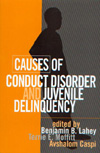
Causes of Conduct Disorder and Juvenile Delinquency
$47.00
0729
Benjamin B. Lahey, Terrie Moffitt, Avshalom Caspi
A great deal has been learned about serious child and adolescent conduct problems, but their causes are still not well understood. This book brings together an international group of leading authorities to advance specific, testable hypotheses about the causes of conduct disorder and juvenile delinquency. Four general causal models are delineated: the social learning model, the developmental pathways model, an integrative antisocial propensity model, and an integrative ecological-developmental model. Also provided are models focusing on specific aspects of the origins of conduct problems, including contextual, psychological, and biological influences. The authors present significant, original theoretical work and map out the kinds of further studies needed to confirm or disconfirm their new or revised hypotheses.
Hardcover, 370 Pages
Contents
Foreword, Farrington and Loeber
- Research and Theoretical Strategies
- Crucial Paths from Risk Indicator to Causal Mechanism, Rutter
- General and Integrative Causal Models
- A Social Learning Model of Child and Adolescent Antisocial Behavior, Snyder, Reid, and Patterson
- Life-Course-Persistent and Adolescence-Limited Antisocial Behavior: A Ten-Year Research Review and a Research Agenda, Moffitt
- A Developmental Propensity Model of the Origins of Conduct Problems during Childhood and Adolescence, Lahey and Waldman
- Social Mechanisms of Community Influences on Crime and Pathways in Criminality, Wikström and Sampson
- Targeted Causal Models
Development of Conduct Problems during the Preschool Period
- Starting at the Beginning: Exploring the Etiology of Antisocial Behavior in the First Years of Life, Keenan and Shaw
- Why Socialization Fails: The Case of Chronic Physical Aggression, Tremblay
Cognitive Factors
- An Early-Onset Model of the Role of Executive Functions and Intelligence in Conduct Disorder/Delinquency, Nigg and Huang-Pollock
- Do Social Information-Processing Patterns Mediate Aggressive Behavior?, Dodge
Genetic, Environmental, and Biological Influences
- Prefrontal Deficits and Antisocial Behavior: A Causal Model, Ishikawa and Raine
- Testing Alternative Hypotheses Regarding the Role of Development on Genetic and Environmental Influences Underlying Antisocial Behavior, Rhee and Waldman
- Prenatal and Perinatal Influences on Conduct Disorder and Serious Delinquency, Brennan, Grekin, and Mednick
Animal Models of the Causes of Aggression
- Social and Biological Mechanisms Underlying Impulsive Aggression in Rhesus Monkeys, Suomi





